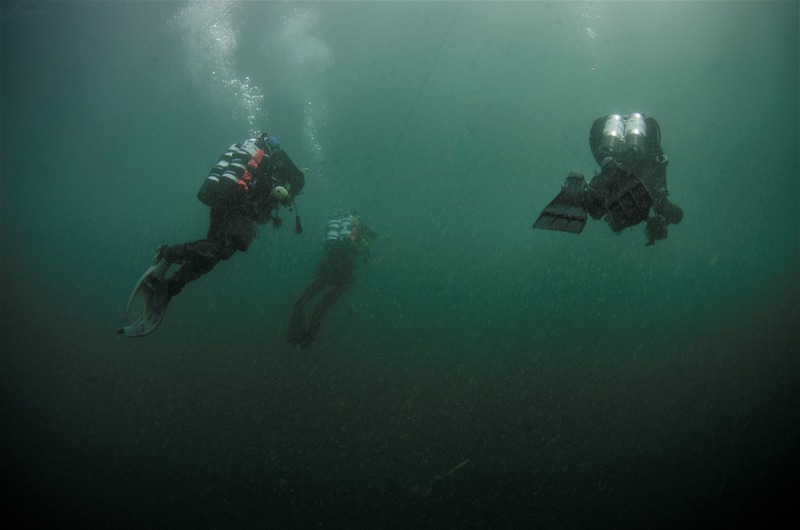Will you help transform our understanding of Britain’s naval and maritime history?
The wreck of royal warship, The Gloucester, which sank 340 years ago, was discovered off the coast of Great Yarmouth by Norfolk-based brothers, Julian and Lincoln Barnwell, and their friend James (Tiny) Little. The shipwreck, hailed as the most significant historic maritime discovery since the Mary Rose in 1971, was announced to the world in June 2022.
This important historical research project led by UEA’s Prof Claire Jowitt and Dr Benjamin Redding, will explore not only how and why the Gloucester sank, but theories about the tragedy’s causes and its political consequences. Their work will go on to reveal the lives of those on board, build a clearer picture of 17th century society, and tell stories of political intrigue, gossip, scapegoating and class.

Credit: Norfolk Historic Shipwrecks
UEA’s Role in The Gloucester Project
UEA is the academic partner of The Gloucester (1682) Charitable Trust, founded to rescue and record the findings from The Gloucester shipwreck and document and display them for posterity.
Along with Norfolk Historic Shipwrecks and Norfolk Museums Service, UEA historians co-curated the major exhibition ‘The Last Voyage of the Gloucester: Norfolk’s Royal Shipwreck 1682’ which runs until 10th September 2023 at the Norwich Castle Museum. The exhibition, which opened on 25th February 2023, has received high acclaim, and displays artefacts rescued from the seabed, including the iconic bell that first confirmed the ship’s identity.
Credits: Norfolk Museums Service
Why is the Gloucester Project Important?
The significance of the Gloucester and its tragic final sailing in 1682 should not be understated; not only do the stories of the Gloucester offer a unique insight into life in Britain 340 years ago, but if the Duke of York had drowned when the ship ran aground, British history would be profoundly different.
At the time of the sinking, Charles II was on the throne and his brother James, Duke of York, was next in line for the throne. If James had drowned, Charles II’s illegitimate son – James Scott, the Duke of Monmouth, may very well have inherited the throne on his father’s death in 1685.
Probably, another civil war could have erupted between two factions: one supporting the claim of King Charles's illegitimate Protestant son, Monmouth, and the other favouring the claims of the Duke of York's legitimate Protestant daughter, Mary, and her foreign husband, William of Orange. This would have presented a challenging decision for patriotic Protestant Englishmen, as William held significant political influence through his marriage to Mary.
The story of the Gloucester takes place during a time of political upheaval, and this research endeavour also aims to enhance our comprehension of various aspects of the seventeenth-century navy. By delving into the ship's operations, as well as its connections to the political, social, economic, and cultural landscape of the era, this project intends to shed light on the rapid development of naval infrastructure and supply lines brought about by a series of reforms.
We need your help!
The early historical research has been funded by the Leverhulme Trust until 2024 and we now need to urgently build a permanent academic centre for Maritime History to ensure that we can supply dedicated research for the Gloucester for many years to come as the ship and her contents are slowly revealed.
Initially, the post of ‘Lecturer in Maritime and Early Modern History’ is critical to the Gloucester project’s immediate research capacity. This lectureship is currently held by Dr Ben Redding in the UEA School of History and we now need to urgently secure additional funds to ensure the future of this position at UEA. Our most pressing funding priority is therefore to generate a three-year extension to this lectureship, from 2024 to 2027, to ensure that we can research the ship’s life, crew, passengers and voyages - work that promises to radically improve the nation’s understanding of 17th century maritime and social history.
But then we hope to go on to support the proposed development of a new academic Maritime Heritage Centre at UEA, building on the work of Prof Jowitt and Dr Redding and establishing an important arm of the School of History at UEA which can contribute even more significantly to the national academic endeavour in this field.
With your support now, we can unearth the secrets of Gloucester's battles in the Anglo-Dutch wars, her wrecking on 6 May 1682, and ensure that these incredible tracts of history are revealed and preserved for generations to come. Join us in supporting the Gloucester Project today and become a part of this remarkable journey into the past.
If you’d like to find out more, or make a larger gift, contact the Development Office at giving@uea.ac.uk or call us at +44 (0) 7990 438106.
Loading...

:focus(676x464:677x465))
)
)
)
)
)
)
)
)
)
)
)
)
)
)